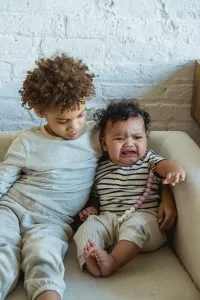Parenting is humanity’s oldest job. Sometimes it can feel impossible, like when a toddler throws a separation anxiety-fueled public tantrum. But humans have been parents longer than we’ve been merchants, farmers, or perhaps even artists. We’ve gotten this far! And nowadays, we know that making subtle changes in our routines can ease the transition to allowing other guardians to care for our little ones.
What is Separation Anxiety?
 Separation anxiety refers to the stress children feel when separated from their parents or primary caregiver. When they sense they are without their primary caregiver for a long time, they go into panic mode. This is a common phrase, and they will grow out of it. Separation anxiety in toddlers is not a bad thing: it means they realize they are autonomous from their parents, and the bond with the parent is strong. These are signs of healthy development.
Separation anxiety refers to the stress children feel when separated from their parents or primary caregiver. When they sense they are without their primary caregiver for a long time, they go into panic mode. This is a common phrase, and they will grow out of it. Separation anxiety in toddlers is not a bad thing: it means they realize they are autonomous from their parents, and the bond with the parent is strong. These are signs of healthy development.
Signs of Separation Anxiety in Toddlers and Young Children
The signs of separation anxiety usually occur when the primary caregiver prepares to depart. Here are some signs to look out for as you strategize how to deal with separation anxiety in toddlers:
- Throwing a tantrum
- Restlessness and physical clinging
- Rejection of the replacement caregiver
These symptoms will worsen if the child is hungry, tired, or sick, so try to time your departures for when they’re not feeling this way.
Knowing the biggest triggers will help you plan for how to deal with separation anxiety in toddlers. These include:
- Goodbyes: Although toddlers are beginning to understand object permanence (just because someone is out of sight or earshot, they still exist), you represent safety and security to them, and they need assurance that you will come back.
- Bedtime or naptime: They know this marks the beginning of an extended period of alone time.
- Large crowds: Your toddler may sense that they could lose you in a crowd, so be mindful of how your toddler is reacting.
Note that separation anxiety can rear its head at different points, and every child is different:
- When do babies have separation anxiety? Separation anxiety in infant children usually begins around nine months, but sometimes as early as four months. Some infants skip this stage, and it only becomes apparent when they are older.
- For toddlers: Between 15-18 months is common. With separation anxiety, toddlers typically have the most dramatic tantrums, but they will pass.
- The age when separation anxiety tends to be the most common is between eight and eighteen months. Sometimes life events trigger it, like a new sibling being born. Other times, the child won’t experience it at all.
How to Help a Child with Separation Anxiety
In preparing for your temporary separation, be present and consistent with your child. Know that when the primary caregiver is out of view or earshot, separation anxiety symptoms will subside. But in the meantime, here is how to help a toddler with separation anxiety and how to deal with separation anxiety in babies:
Don’t drag out the goodbye
It’s enough to hug your child and tell them to have fun! If you make a big deal out of leaving or are overly flustered, kids will suspect something is wrong and feel anxious. Keep it brief and simple to establish trust and security.
Create a departing routine
Rituals are soothing. Repeating a comforting phrase with a pat on your child’s back when you leave reminds them that your departure is not scary: it’s a familiar routine.
Create a relaxing bedtime ritual
Whether it’s storytime in the bath or applying lavender lotion while singing, instilling a calming routine before bedtime will ease the transition into solo sleeping. A teddy bear, night light, or soothing soundtrack of nature sounds may help keep them company.
Allow post-nap alone time
If you notice your child is content to be alone when they wake up, take your time retrieving them. Associating alone time with contentment will make your child feel more secure when it’s time to say goodbye.
Address the anxiety
Don’t ignore it. Assure your child it’s okay to miss you but that you will return, and they will be looked after in the meantime.
Occupy their mind with an activity
Don’t sneak away while they’re distracted, but have a game or activity prepared for them to take their mind off your absence.
Notice their behavior in big crowds
If they’d rather stay by your side, let them. Don’t push them into the arms of others if they signal they’re not ready. Don’t worry—they will be ready one day.
Honor the time
If you say you’ll be home in two hours, try your best not to check on them mid-way through or come home late. Additionally, describe time in a way your child can understand. Time passes differently for toddlers: a few minutes and a few hours can feel the same. They likely won’t understand what “two hours” means, but they’ll understand “see you after snack time.”
Start small
Leave your child with a guardian or at a playdate in small increments so that when the time comes, they’ll be ready for preschool.
Most of the time, your child’s separation anxiety will alleviate with time and the tips above. But if you notice your child’s anxiety symptoms are intensifying (in the form of vomiting, nightmares, etc.) for four weeks or more, it may be a sign of separation anxiety disorder (SAD). Click here for more information on how to help your child with SAD.
Need More Support? Consider an Au Pair
As a parent, it’s natural if you have baby separation anxiety or toddler separation anxiety yourself! But life goes on, and sometimes you need help in looking after your little one. Having an Au Pair is like another live-in parent who can offer unique cultural perspectives, help around the house, and transition your child to being comfortable around other caretakers. Find out how Go Au Pair can help today.


